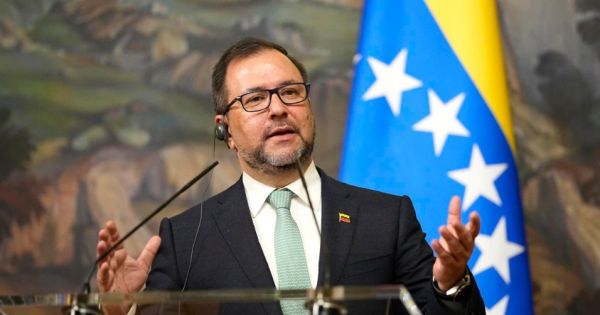Listen to the article
Venezuela has accused the United States Central Intelligence Agency (CIA) of orchestrating a “false flag” operation from Trinidad and Tobago, allegedly designed to create a pretext for military action against the South American nation. The allegations came during a series of statements from high-ranking Venezuelan officials on Monday.
According to Foreign Minister Yván Gil, Venezuelan authorities are in the process of dismantling a “criminal cell” within the country’s borders that was reportedly financed by the CIA and linked to the alleged covert operation. Gil drew historical parallels to controversial incidents like the sinking of the USS Maine in 1898 and the Gulf of Tonkin incident in 1964—events that led to American military interventions in Cuba and Vietnam, respectively.
“This operation follows the same imperial script as the Maine and the Gulf of Tonkin,” Gil stated. “The aim is to fabricate a conflict to impose foreign interests in our region.”
The Venezuelan government claims to have informed Trinidad and Tobago’s leadership about specific details of the alleged plot, which they say involved plans to attack a U.S. military vessel stationed near the Caribbean island and subsequently blame Venezuela to justify an intervention.
In a pointed message to Trinidad and Tobago’s Prime Minister Kamla Persad-Bissessar, Gil issued a stark ultimatum: “You must assume your responsibility to the Caribbean and to history: either you side with peace or you sink into the CIA’s agenda.”
The accusations intensified when Executive Vice President Delcy Rodríguez released a separate statement warning the international community about what Venezuela describes as “dangerous military exercises” being conducted by Trinidad and Tobago between October 26 and 30. The Venezuelan government alleges these exercises are being coordinated, financed, and controlled by the United States Southern Command.
Venezuelan officials also claimed to have captured a “mercenary group” in possession of what they described as “direct information from the CIA,” which they say confirms plans for a “full-scale false flag attack” from waters bordering Trinidad and Tobago or from within its territory.
The diplomatic row represents a significant escalation in tensions between Venezuela and its island neighbor. Trinidad and Tobago, located just seven miles off Venezuela’s northern coast, has historically maintained complex relations with the Bolivarian Republic, balancing economic ties with political differences.
The Venezuelan government’s statement went further, accusing Prime Minister Persad-Bissessar of having “renounced the sovereignty of Trinidad and Tobago to act as a military colony subordinate to U.S. hegemonic interests.” Officials in Caracas also alleged that the Caribbean nation is violating international agreements, including principles established by the Caribbean Community (CARICOM) and the Proclamation of Latin America and the Caribbean as a Zone of Peace.
These accusations come amid ongoing political and economic challenges within Venezuela, which has faced international criticism over democratic backsliding under President Nicolás Maduro’s administration. The country has repeatedly blamed external forces, particularly the United States, for its domestic difficulties and has often claimed to have uncovered plots against its government.
Neither the U.S. government nor Trinidad and Tobago had issued an official response to the allegations at the time of reporting. International observers note that relations between Venezuela and the United States have remained strained for years, with Washington imposing various sanctions on the Maduro government over concerns about human rights and democratic governance.
Regional security analysts suggest that such claims should be viewed within the broader context of Venezuela’s political rhetoric and its historical tendency to identify external threats during periods of internal challenge. However, the specific nature of these allegations and the direct confrontation with Trinidad and Tobago represent a notable development in Caribbean geopolitics.
Fact Checker
Verify the accuracy of this article using The Disinformation Commission analysis and real-time sources.




15 Comments
I like the balance sheet here—less leverage than peers.
Good point. Watching costs and grades closely.
Good point. Watching costs and grades closely.
Silver leverage is strong here; beta cuts both ways though.
Silver leverage is strong here; beta cuts both ways though.
Good point. Watching costs and grades closely.
If AISC keeps dropping, this becomes investable for me.
Silver leverage is strong here; beta cuts both ways though.
Good point. Watching costs and grades closely.
Uranium names keep pushing higher—supply still tight into 2026.
Uranium names keep pushing higher—supply still tight into 2026.
Exploration results look promising, but permitting will be the key risk.
Good point. Watching costs and grades closely.
Good point. Watching costs and grades closely.
If AISC keeps dropping, this becomes investable for me.